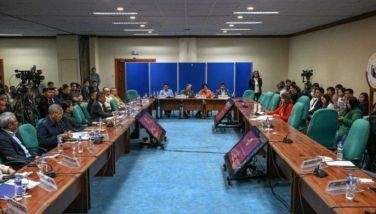Nayda and women like her
Her nickname sounds like the last name of author-motivational speaker, quite controversial long-distance swimmer, Diana Nyad portrayed by Annette Bening in the film, “Nyad.” Nyad rose to fame when, at age 60, she attempted to make multiple swims along the Straits of Florida hoping to set a world record.
Nayda is our on call helper. In her own circle or by society’s standard, she may be ordinary. By my yardstick, she’s somebody – a poster girl for resilience and industry.
How she became a part of our family, my parents’ household, is now vague to me. She’s a fixture around our neighborhood peddling fresh produce or at times cleaning homes or washing clothes. The kind of chore that doesn’t require a machine but a laborious hand washing routine, punctuated by rhythmic beatings of palo-palo against heavy fabrics, while carefully bleaching white clothes under the cheerful noonday sun. You’d know she’s half-done when she breaks for coffee and bread and you’d know she’s finally done when the scent of detergent gusts through the air while rows of spotless garments gaily sway by the clotheslines; as if heralding the devoted hands that made them fragrant, immaculate and ready to be worn again.
But there’s more to her attentive hands. This I learned during a homecoming as we chatted over snacks of nilupak and brewed coffee. Igso Nayda, as my siblings and I call her, short for Zenaida, is a wife, mother, grandmother, almost toothless, always smiling, 60-something. She loves to wear lipstick (she’s partial to flaming red) and dress up a bit. How she likes my sister’s and my own hand me downs! Igso is a term of endearment in our dialect for a parent’s godchild – kinakapatid, in other words.
Nayda loves to tell stories, never mind if they sometimes border on marites. Through her engaging accounts I came to know her more – her character, her vocation and the work ethic she swears by.
It was while enjoying our chewy nilupak did Nayda tell me her daughter was sick that day because she joined a multitude to line up for ayuda as early as 2 a.m. Nayda thinks it wasn’t worth queuing up under the rain and sacrifice one’s health for five kilos of rice, a pack of bihon, two cans of sardines and P200. She counseled her daughter that five kilos of rice would only last you a few days but if you plant and work hard, you could provide for your family every day, she told me in our dialect. Half smirking, she said she knows what ayudas are for: that they are in return for something.
Whether out of distaste or decency, her indifference toward ayuda reminds me of a compelling line from a book I’m currently reading, “Reagan – His Life and Legend,” one of the NY Times top 10 books for 2024. President Reagan was said to have quoted President Franklin Delano Roosevelt, who amidst the Great Depression opposed welfare dependency and thus told Congress: “To dole out relief in this way is to administer a narcotic, a destroyer of the human spirit.”
As we snacked, Nayda recollected how kamoteng kahoy, as we also call cassava, became her family’s saving grace for what could have been a period of hunger during the pandemic. She planted rows upon rows of cassava in a parcel of land she tills as a tenant. She was pleased with the abundant harvest and the money she earned from selling them. With her excess earnings, she bought P500 worth of corn seeds and sowed them. Three months later, she reaped several kilos of corn, sold them and earned eight times more than what she spent for seeds. She alternately plants cassava with corn, while malunggay, papaya and guyabano trees, banana plants and kamote creepers also surround her home. They are easy to tend, she claims, and when they mature or ripen she peddles them while her family consumes the rest.
While waiting for harvest time, Nayda works as a stay-out helper washing or ironing clothes, cleaning homes or assisting elderly neighbors who would need her help for a fee. Sometimes she’d cook and sell cassava suman (stuffed with sweetened luscious young coconut), which has become our family’s favorite. I am never out of work, she declared with sparkling joy and an effervescent dignity.
Nayda fascinated me. I know that she was not just telling a story. Her sunburnt skin and wrinkly hands say so. On that day, I said to myself: here in front of me is an ebullient, diminutive lady, barely 100 pounds, hardly made it to high school yet a quintessence of conscientiousness, acumen and grit. She’s one tough woman who, unquestionably, learned sensible skills from a nobler school called life.
Nayda and women like her are integral parts of our informal economy. A study published by the UP Center for Women and Gender Studies cites that “women make up 37 percent (eight million) of total wage and salary workers in the country.” At the height of the pandemic they were saddled with multiple risks and obligations resulting from joblessness. Yet it was in the very same milieu where these women discovered creative ways and alternative means of livelihood to survive. The research suggests, “The coping strategies by women in the informal economy have shown their resilience and resourcefulness.”
We have millions of Naydas in our society, a good number of them being an essential part of many households. In some cases they are even considered members of the family. At the height of the pandemic, these women, the study revealed, “diversified their products and services” while others were brave enough to “totally change their livelihood/enterprises” and started afresh.
The unshakable Diana Nyad lives by her three-line mantra, “find a way.” It is undeniably the very same spirit that drives Nayda and millions of indomitable women like her.
- Latest
- Trending




























